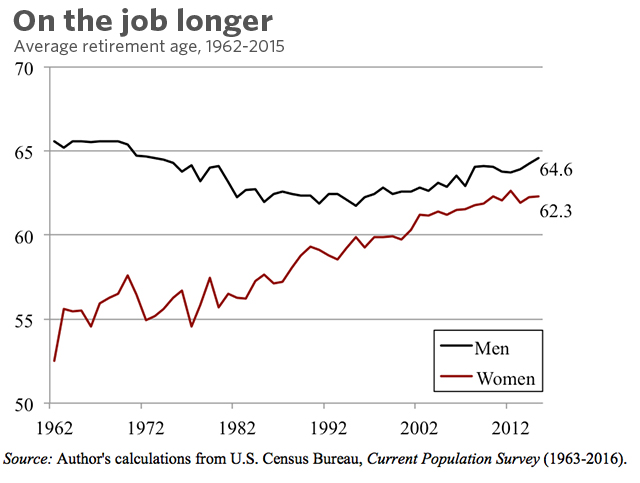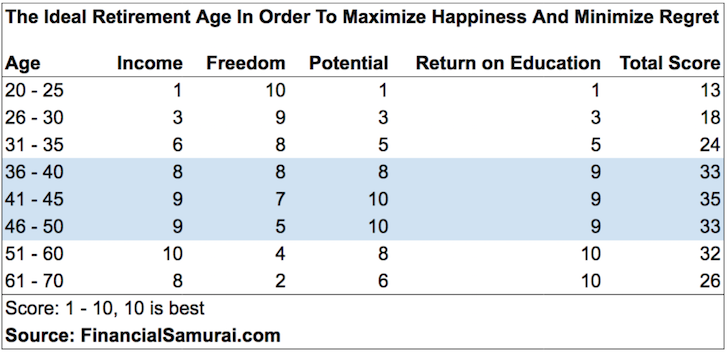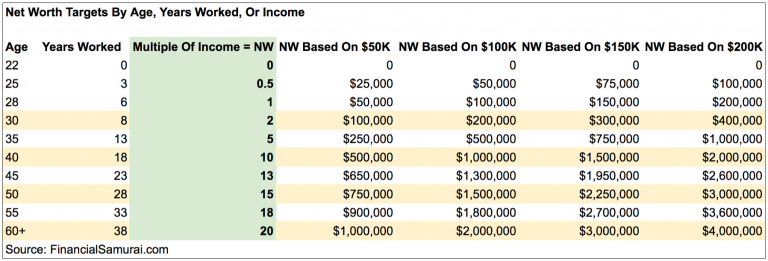 When I was 30, my goal was to retire in 2017 at the age of 40. I figured, after spending my 20s learning, I should spend my entire 30s earning.
When I was 30, my goal was to retire in 2017 at the age of 40. I figured, after spending my 20s learning, I should spend my entire 30s earning.
Now that I’m almost 41, I’m glad I didn’t wait until 40 to leave the workplace for good. Life doesn’t end once you retire. It simply morphs.
Although I no longer consider myself retired with all the work that goes into running this site and being a stay at home dad, here are some things that have happened since 2012:
1) Written a book called, How To Engineer Your Layoff: Make A Small Fortune By Saying Goodbye.
2) Traveled to 30+ new countries in Europe and Asia with my wife. Angkor Wat, Cambodia was truly amazing.
3) Gotten my USTA tennis ranking up from 4.5 to 5.0. This would have not been possible without all the newly found time to practice.
4) Consulted for several financial technology startups ranging from seed stage to series C.
5) Built this site into over a million organic pageviews a month with no forum.
6) Grew passive income by 2.5X.
7) Bought and remodeled a fixer.
8) Became a foster child mentor.
9) Became a high school tennis coach
10) Became a father.
I’m excited what the future will bring!
Factors Involved In Retiring
Before we discuss the ideal age to retire, let’s take a look at what the average retirement age is in America. As you can see in the chart below, the average retirement age for men has risen to about 65 and to 63 for women, if we are to round up for 2018.
The trend to work longer for men since the early 1990s is probably due to changes in Social Security, pension eligibility, less strenuous work, longer and healthier lives, more educational requirements, and a decline of retiree health insurance.
The constant increase in retirement age for women is likely due to increasing workforce participation plus all the same reasons men face. In a land of equality, I suspect the average retirement ages will eventually be the same.

Now that we have a baseline for the average retirement age in America, let’s go through some retirement age ranges and discuss where someone is probably at in their lives and whether such an age range is good for retiring.
Things to consider for the ideal retirement age include:
- Length of time spent in school
- Cost of education
- Student loans
- Multiple job changes in a career
- Graduate school
- Children
- The desire to spend time with aging parents
- Healthcare costs
- Passive income generation
- Overall health
- Life expectancy
In order to retire comfortably, I believe one needs at minimum 20X their average annual expenses in liquid net worth e.g. $100,000 annual spend, $2,000,000 in stocks, bonds, CDs, and cash. You can retire with less, but you’ll always be looking over your shoulder wondering when the boogey man will get you.
The chart below uses 20X average income to be more conservative.
The Ideal Age To Retire
Ages 20 – 30: Unless you’re leaving work to be an entrepreneur or a stay at home parent, this is a suboptimal age range to retire, even if you have the money. Your energy and enthusiasm will generally be the greatest at this age. To spend it on a beach doing nothing would be a darn shame. Further, spending more time getting an education versus working sounds like a waste of an education. You’re expected to live another 50-60 more years. The ratio of learning, to work, to leisure is off.
Ages 31 – 35: Most people only start gaining confidence at work after they’ve hit 30. Before then, you’re a cost center doing your best to learn everything you can about the business. Why else do you think there are no CEOs under 30, except for at startups that have failure rates of over 90%? Your 30s is a time to leverage all the experience you’ve gained in your 20s to position yourself for greater rewards. Unless you have something very clearly in mind that you want to do in retirement, to retire before the age of 35 is to prematurely truncate your potential.
Ages 36 – 40: After five years of seeing what you can do in your 30s, you realize that more money and power gets old after a while. You’re still young enough to try something new, but you may be getting squeezed by a mortgage and kids. Just as 30 was a big age for the motivationally inclined, 40 is equally big because this may seem like your last chance to change your destiny or be stuck doing the same thing in the same industry for the rest of your life.
Ages 41-45: You’re likely in your prime earning years, making leaving your job that much harder. But after 20 years of work, you won’t feel as much shame retiring or taking things down a notch. After all, you’ve been working longer than the time you spent in school. You’re also starting to feel that life speed is accelerating. 50 is right around the corner! You think more about your mortality because you’re probably less in shape and more injury prone. You feel like it’s now or never to make a move.
Ages 46 – 50: The closer you are to 50, the more you may be wondering how you lasted for so long working at a job that doesn’t tickle your soul every day. Can you truly say the work you do makes a positive impact on society? You may begin to wonder how your life might have been different if you had taken the leap of faith earlier. If you have kids, you may be questioning whether spending all that time away from them was truly worth it since they’ll soon be entering their own phase of independence.
Ages 51 – 60: Perhaps you’ve waited this long because you wanted your kid(s) to get through college. Or maybe you just couldn’t quit the money and the prestige granted upon you after 30+ years of work. Or maybe you are lucky enough to have a pension that keeps on paying you more for every additional year you work past 20 years. Whatever the case may be, you better have loved what you did or else you will feel regret having waited this long to retire.
Ages 61+: Not only do you feel a sense of accomplishment for lasting this long, you also feel a great amount of nostalgia. Where did all the time go? You wonder. Hopefully you’re done or almost done with paying for your children’s education. Further, there just might be a healthy pension waiting for you. At the very least, you can withdraw from your pre-tax retirement accounts penalty free if you wish. Just make sure you do so in a way to minimize taxes. God willing, there should be another 20 years of life left to enjoy. You plan to make the most of it.
The Ideal Age Range To Retire: 41 – 45

Going through the age ranges, I believe the ideal age to retire early is between 41 – 45 years old once you’ve got at least 20X your annual expenses saved up. It’s the optimum age where you’ve put in your dues, earned a good sum, minimize regret, and still have enough energy to do something new.
If you retire at 41, you won’t be left wondering whether you wasted your 30s because you’ve already spent all of your 30s seeing what you could do as an employee or as an entrepreneur. If you retire at 45, you will feel at ease knowing that you gave 20+ years post high school or college to seeing what you could do at work.
At 41, I no longer have the enthusiasm or hunger to create and earn big bucks like I did in my early 30s. If I had used my energy to keep earning at my day job until now, I probably would have hit a bamboo ceiling because of the politics involved in getting promoted.
I worked in a satellite office that already had two Managing Directors. The only way I’d have been able to get promoted was to move to Hong Kong or New York City. Such a move didn’t make sense due to the large drop in quality of life compared to San Francisco. Therefore, staying in the same role for seven more years would have left me bored and a little bitter.
Instead, I used my energy between 35 – 40 to create something of my own. It is the creation of something from nothing that will give you the most satisfaction. I would choose running Financial Samurai over being the CEO of my previous firm any day.
The main reasons why I left at 34 were because I had a large severance package and a clear idea of how I wanted to spend my time. In effect, my severance package accelerated my retirement by five years because the severance was worth five years of living expenses. Without a severance package, I probably would have kept working until 40.
You Might Find Yourself Busier Than Ever In Retirement
The beauty of leaving the workforce is that you get to focus all your energy doing what you truly want to do. Because you have endless options, you tend to take up as many things as possible. You’re like a kid in a candy store with an unlimited budget. The only restraint is your energy and time.
Not only do I enjoy writing, I’ve discovered since leaving full-time work that I really enjoy working with kids. Sometimes they might tackle you too hard or tell you to “shut up,” but that’s all part of the process of being a good mentor, teacher, or coach.
What I’d love to do in the near future is teach kids about online media and entrepreneurship at the school my son plans to attend. It’s a great way to stay involved with the community while also having something meaningful to do. He might not think it’s cool if his old man is always there, but I will!
Note: There is a poll embedded within this post, please visit the site to participate in this post's poll.Related:
How Much Do I Need To Save To Retire Early
The Dark Side Of Early Retirement
The Fear Of Running Out Of Money In Retirement Is Overblown
Readers, what age or age range do you think is ideal for retiring? Share your reasons why.
The post The Ideal Retirement Age To Minimize Regret And Maximize Happiness appeared first on Financial Samurai.

No comments:
Post a Comment